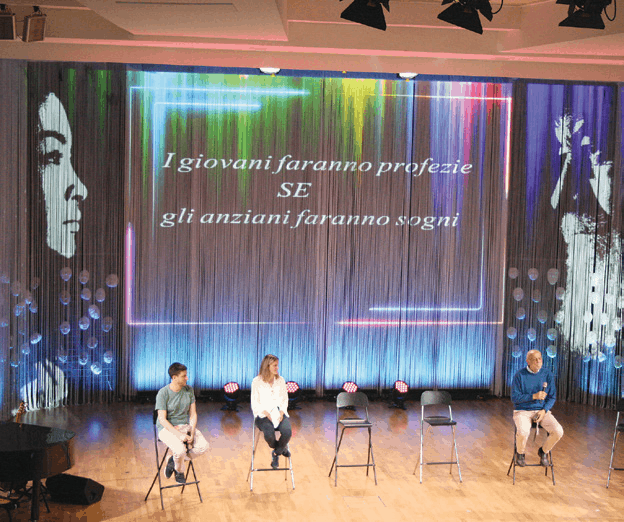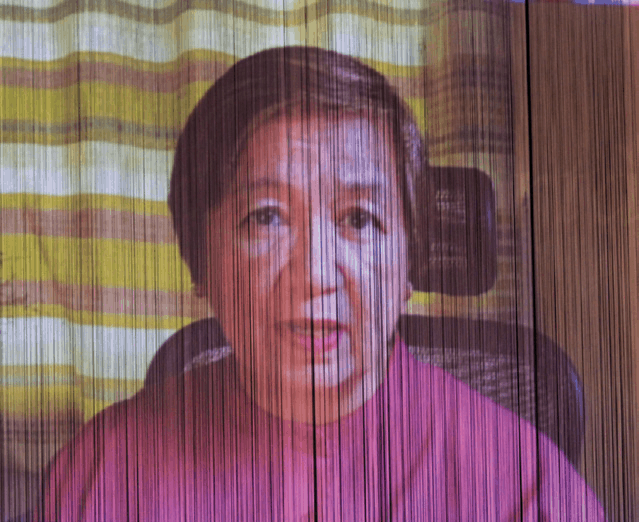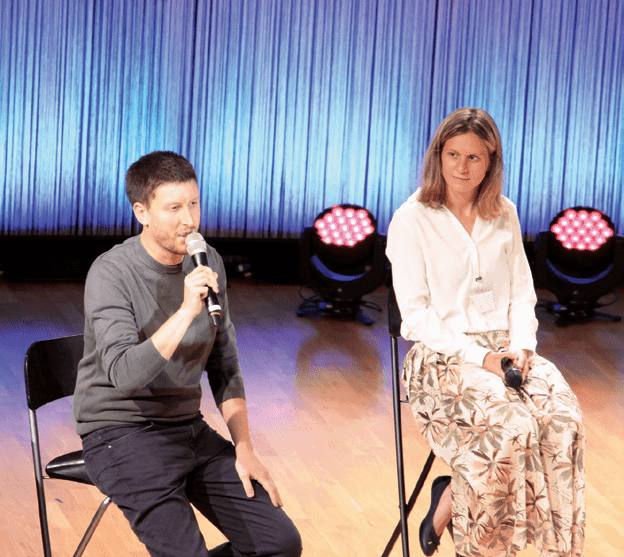
Economy and communion, two words that very rarely go together, but to Chiara Lubich, prophetically, it seemed necessary to connect them together, as a response to poverty and inequality. Visiting the vibrant city of São Paulo in Brazil, she saw a city full of glittering skyscrapers surrounded by a “crown of thorns”: the favelas[1] that, submerged by poverty, created a striking economic and social contrast to them. That scene, which contained the pain of an economic system that hurts, was the inspiration for something bigger and deeper: an economic movement based on the culture of “giving.”
Since then, the Economy of Communion has become the harbinger of processes that bring us closer to a more fraternal world, thanks to companies, entrepreneurs, scholars, and organizations that live communion!
The program featured protagonists of these three decades of the Economy of Communion. The starting point was the exhortation by Chiara Lubich: “Let’s not forget the poor,” which is the first and fundamental objective of the Economy of Communion.
Going back in time: 1991
The program recalled the time when the EoC started during Chiara’s visit to Brazil in 1991. In fact, on May 29, 1991, Chiara encouraged the whole Movement in Brazil to have a wide-range communion of goods – the economy of the five loaves – a common good for all.
Those who were present during Chiara’s launch were interviewed like Rodolfo Laibholz, an entrepreneur who shared, “We tried to improve the lives of people in our company. We risked after Chiara launched the idea. It was so strong. It changed our lives… The proposal became a mission… We have the joy of seeing young people’s contribution to EoC.”
Emilio de Souza Strapasson followed, “I was a teenager in 1991. It was like a bomb when Chiara launched EoC. It was not just giving our extra but creating wealth through our work… I believe that EoC is giving us a hand, a gift but also a responsibility.”
Maria Helena Faller, president of ANPECOM, an NGO that coordinates the Focolare’s social projects in Brazil said, “I was 4 years old at that time. I had 2 dolls, my shoes and I gave them to a poor girl. It was not enough. I held the hand of the girl at the door. I met EoC when my family received help from them for 12 months. They gave with dignity.”
Roots of EoC: Trent
During the program, we went back to the roots of EoC, back to Chiara’s city of Trent. It was a time of war. Everything was collapsing. Sacks of flour, clothes, and food arrived at the apartment of Chiara and her first companions which in turn distributed them to those in need. The focolarinas during their meals sat beside a poor person whom they invited to dine with them. They felt the strong presence of Christ in their midst. His presence gave meaning to their lives. Chiara and her first companions gave up everything. They slept on the floor, with Christ as their only treasure. Symbolically, to remind themselves of their choice of God, on the wall they hang an image of Christ abandoned, who cried out “My God, My God why have you forsaken me!” (Mt 27:46). With such a choice of God, they felt that they were not lacking in anything. 50 years after the war, the Economy of Communion was born. Their experience of giving is now put in a global context, sharing work and profit, saving lives and creating opportunities for the poor, and exposing what is lacking in the world: communion. Now with EoC, there is the Invisible partner (Divine Providence), the formation of people and profit-sharing.
Sociologist Vera Araujo encouraged everyone to be committed to the founding elements of EoC for as she said, “The road is wide-open for a true leap of quality.”
Never Alone
Professor Luca Crivelli discussed the challenges of the past 10 years of EoC history. He shared about the prophetic intuitions of EoC like a strong commitment, community discernment, and he spoke about innovation as produced by creative destruction, following the lead of the Holy Spirit. He pointed out the attention to the new generation (youth). He spoke of two initiatives of EoC which went on a global scale: the Prophetic Economy in 2018 and the Economy of Francesco in 2019-2020. In 2013, he remembered the growth of entrepreneurial vocations, which are now rich with stories of Providence, holiness, and heroism. He also spoke about incubating networks, also of the Leo Andriga Poverty Observatory (OPLA), trying to reach out to the “crown of thorns” all over the world, and humanizing markets, and the Slot Mob protest in Italy. He proposed 4 intuitions: first, a strong collective commitment to the ideas of Chiara. Second, never initiate an event without profound dialogue and collaboration with young people. Third, never initiate actions without the active participation and presence of the poor. And lastly, never promote an initiative alone, “Never alone and to find companions together in the journey,” Crivelli highlighted.
Crivelli spoke of entrepreneurial vocations to fight injustice like micro-credits, incubators,[2] and innovating products which contribute to the goals of EoC. He affirmed that EoC went beyond the structures of the Movement. He pointed out the prophetic side and universality of its goals.
A Company is not enough
There was the theme on “A company is not enough” which spoke of the focus on sharing and not only philanthropy. Economist Alberto Ferucci shared that for him, EoC is an experience of working in the presence of God. It is a commitment to grow together and gives greater motivation to entrepreneurs. Another entrepreneur Isaias Hernando spoke about how one business is not enough as EoC calls for racial and economic inclusion. He added that EoC calls us to build a system where there are no more victims, as Pope Francis told the EoC participants in Rome in 2017, and when this is achieved, it is only then “when we can have a celebration of human fraternity.”
Sister Poverty

Another topic was Sister Poverty in dialogue with women economists like Geneviève Sanze, Coordinator for Finances of the Focolare Movement, Francesco Tortorella and Martha Pancheva (OPLA), Lia Guillen (Action for a United World), and Teresa Ganzon. Ganzon, head of Bangko Kabayan, a micro-credit bank in the Philippines, shared about reaching out to the “un-bankables” and its one-client-at-a-time initiative, which build a culture of giving and promote values of integrity and care for the environment. She said that helping is contagious and education is a great equalizer as they ventured to assist the education of their clients too. Dr. Anouk Grevin of Nantes, France gave a beautiful synthesis and analysis of the fruits of EoC, pointing out that EoC businesses are fighting poverty, just like the 900 women members of Kuña Aty in Paraguay, the micro-credit bank Bangko Kabayan in the Philippines, and Sung Sim Dang bakery in South Korea. She said that, for years now, EoC has become a culture and a lifestyle. She pointed just like the example of Bangko Kabayan that these bank employees don’t feel that they are bankers but community developers – people who work for others and the human development of their communities.
There was the EoC in dialogue with Jean Tonglet of ATD Fourth World, who spoke of the primary mission of EoC. He spoke of the poor, not that we think for them, but that we think with them, and from them, we learn to advance economic models that can benefit everyone. He forwarded 3 points: to consider that everyone can be hired, and everyone can create; to give priorities to those farthest from work, and to target culture which is an important influencing aspect.
Passing the baton

There was a session called “Young people will make prophecies, if the elderly have dreams.” Dr. Benedetto Gui dialogued with young people of the EoC Project, Prophetic Economy, Sophia University Institute, and Economy of Francesco. Then it was followed by a dialogue with the economist Stefano Zamagni. Professor Zamagni recalls when Chiara launched the idea of EoC, he had some doubts, “Communion? How can she launch an intellectual courage of this kind?” Now, convinced of EoC, he compared it with other important economic currents like that of civil economy by Antonio Genovese.
The event concluded with messages from Focolare President Margaret Karram and Co-President Jesús Morán. Karram expressed the desire that EoC focus on the person whose goal is communion. She echoed the goals of the recent General Assembly of the Focolare Movement last January 2021 when she was elected as Focolare president: to heed the cry of humanity, of creation, and of young people. Morán emphasized the prophetic charge of EoC and not only its quantity but quality. Professor Luigino Bruni, one of the main convenors of the event, in his message, shared the secrets of generativity of EoC in the last thirty 30 years. First, it attracted people of high quality. It proposes a noble vocation. He said that Chiara set a high-benchmark. It attracted capable and generous people. He thanked young people whom he said “found clean water” in EoC like fish that thrive in clean water. He described EoC as beatitudinal and so, Gospel-based, as well as Marian and charismatic. It cries for justice, and consoles these cries. He described it as the economy of the kingdom of heaven, “already but not yet” though it is not utopian because it is already partially here. Bruni encouraged everyone to continue to run, just like in a relay race. “Now the baton has been passed. The key and delicate moment is the handing of the baton. We must not stop running, but must know when to pass the baton – not too early or too late.” He reiterated how the Economy of Communion is a gift for all.
Jose Aranas
[1] Slums or shantytowns lying on the outskirts of large cities in Brazil
[2] Organizations that help startup companies and individual entrepreneurs to develop their businesses by providing a full-scale range of services starting with management training and office space, and ending with venture capital financing.




